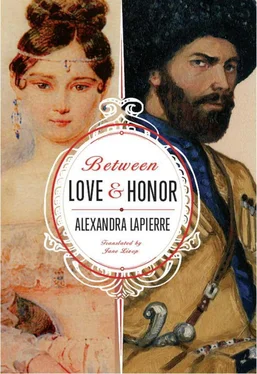The doctor arrived in Soul-Kadi late in the night on June fourteenth. The aul appeared particularly mean and desolate to him.
The house where Jamal Eddin lived was guarded by a sentinel. The patient was living in captivity.
Sacks of grain lay everywhere, and fruit had been left to dry among heaps of clothing at the entrance.
Jamal Eddin’s room was sparsely furnished. A rifle and a saber hung on the wall.
The young man was lying on an iron bed.
He awoke at the arrival of his visitor. Deathly pale, his eyes hollow, Jamal Eddin coughed incessantly.
The doctor tried to ask him a few questions.
But Jamal Eddin realized that the man was completely spent and invited him to sleep first. A mattress had been prepared on the floor next to him. Exhausted, the Russian collapsed on it.
In the morning, the doctor noticed that Jamal Eddin had persuaded his jailers to accept some rather bizarre habits.
While he lacked everything and lived in utter poverty, he insisted that his meager meals be served with the silverware that had been stolen from the princesses, on what was left of their fine china—knives embossed with the family’s coat of arms, fine white gold-rimmed porcelain plates, all the plunder of Sinandali—the ultimate symbols of a lost past.
All signs of wealth and luxury were forbidden by Shamil, and the naïbs and partisans of his brother took Jamal Eddin’s attachment to worldly goods as further proof of his corruption.
Such whims only confirmed their contempt for him.
Although he was surrounded by spies and guarded by men the Russian doctor described as “fanatics,” the patient appeared to be adored by the women who cared for him, the inhabitants of Soul-Kadi, and everyone who came into contact with him.
But he was already so weak and ill that he could no longer walk.
The doctor understood that his pitiful state was due to despair, an acute case of depression that no medicine could cure.
He diagnosed tuberculosis as well.
He found Jamal Eddin “dignified, calm, reasonable,” and fully aware of the gravity of his condition.
The young man was letting himself die. What else could he do?
Doctor Piotrovsky stayed at his bedside for two days.
He was increasingly struck by the fact that the people’s adoration, even adulation, of Jamal Eddin was as strong as the naïbs’ hatred for him was absolute. The dignitaries maligned him incessantly, depicting him as a degenerate to anyone who would listen—especially those who did not know him.
Shamil’s naïbs were the ones who had forbidden him to read the Russian press, the newspapers of Petersburg that Shamil himself had translated for his own information. It was just one more deprivation, added to a long list of others.
Jamal Eddin explained that the imam had had no choice; he had been forced to break him and silence his voice to preserve the love and confidence of his captains.
To the doctor’s way of thinking, this forgiveness made no sense at all. Perhaps Shamil had been forced by circumstance, by public opinion, to behave this way. But the consequences of his actions were before his eyes. He had killed his son.
And local cures were finishing him off.
Jamal Eddin was fed saltpeter scraped from the rocks around the aul together with a variety of fermented plants and minerals, all of which was mixed with donkey’s milk. The concoction had disastrous effects upon the patient.
“I could not cure Jamal Eddin,” the doctor wrote in his report to the commander of the fort at Khassav-Yurt. “I could not even prevent the disease from progressing. I simply tried to assuage his suffering.
“Unfortunately, I am certain that he will not survive beyond another two or three months. At the very most.
“I should add that, instead of preparing himself for this grand and final event that is death, this sensitive young man of such fine character spends his time contemplating the jewels that were stolen from the princesses in July 1854.
“He considers the earrings in particular to be his personal property and hides them very carefully under his mattress.
“But at nightfall, he delicately takes two tiny diamond pendants from their case.
“He holds them in his hand, turning them over in his palm. He never seems to tire of admiring these little teardrops of precious stone.
“Doubtless this occupation distracts him from the specter of Death standing at the foot of his pallet.
“Ah! God, how strange and full of contradictions is the human condition. Who would have imagined that this apparently civilized being is, in the end, interested only in a pair of stolen diamonds? And that on his deathbed, he should never cease to be fascinated by all that glitters, just like all savages?”
The doctor was clearly lacking in imagination.
Perhaps a woman would have understood the secret behind this fascination.
Lisa.
When they had first met, at the relay of Torjok, hidden in the locks of hair that fell from her temples, Jamal Eddin had glimpsed the sparkle of two diamond teardrops that caught the sun.
That was the first time he had laid eyes on the young blonde woman, and the same day he was dazzled—thunderstruck—by love at first sight.
It had been the first promise of happiness.
“The next time I hold you this way,” he had murmured.
He had taken his fiancée’s face in his hands.
“The next time…”
The next time these tiny drops of light dancing at Lisa’s ears trembled between his fingers again, it would be for the rest of their lives.
He never saw her again.
“My brother Alyosha received Jamal Eddin’s last letter, dated June 25, 1858.
“I’m dying slowly, and with great suffering, he wrote. I beg you, try to come and see me, and try to bring another Russian doctor with you. I refuse to let the local doctors treat me any longer. I beg you, bring especially a little note written by Lisa, so that I may see her handwriting one last time. Hurry, or you may get here too late. Kiss Lisa for me. So she knows that I have not forgotten her. So she knows I love her.
“My brother started off right away.
“But when he arrived in the mountains, less than three versts from Soul-Kadi, one of Jamal Eddin’s friends ran to meet him, blocked his path, and gave him the following message from my fiancé: Hurry back to your regiment, Alyosha. I found out that they have let you come to me in order to capture you. Run away, leave, I cannot see you, I do not want to. In any case, I am lost.
“As usual, Jamal Eddin told the truth.
“He died a few days later, on July 12, 1858.
“He was twenty-seven years old.
“They say he is buried on one of the village terraces, looking out over the immensity of the Caucasus.
“As for me, more than sixty years later, I continue to carry within me the living memory of his love. Jamal Eddin’s tenderness, like all of his passions, was limitless.
“He had written to me, ‘Lisa, I shall die without you in the Caucasus.’
“Our story ended with these words.
“I dare to declare, on the eve of my own death, that I would have been happy to marry a man of such character.
“To my sorrow, almighty destiny decided otherwise.”
APPENDIX

What Became of Them
ELIZAVETA PETROVNA OLENINA
Lisa was married twice, the first time to Hippolite Alexandrovitch Dmitriev-Marmonov, the second time to the son of Baron Alexander Engelhardt. Both unions were advantageous, as both of her husbands were aristocrats and members of the inner circle at court. In 1919, with her family’s encouragement, she wrote her memoirs. She told of the famous figures of the literary world she had met at her grandfather Olenin’s home, the thrill of her first ball, and her passion for Jamal Eddin, whom she described as the love of her life. Over sixty years after the young man’s death, he remained vivid in her mind, both as the man she had always dreamed of and a symbol of ideal happiness. He was the incarnation of human dignity, honor, and beauty. “He was tall, dark, and very well built,” she often repeated, “and of royal bearing.” She lived through the turmoil of the revolution and died in 1922 at the age of ninety.
Читать дальше













